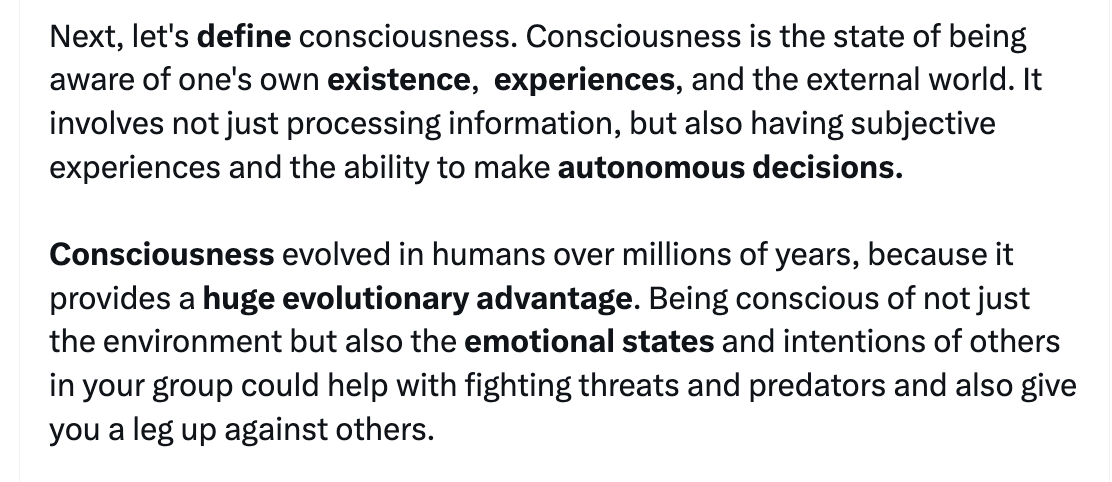1/ Interesting (long) post on AI consciousness, which makes some good points. But there are (it seems to me) many misconceptions too. What AI folk think about consciousness is important, so let's have a look 👀
https://twitter.com/bindureddy/status/1695610692882317404
2/ Consciousness (raw subjective experience, C) is not the same thing as self-awareness (which entails more than this) and sentience (which requires less). There is also no necessary connection between consciousness and free will or (arguably) agency (depends on your thoery) 

3/ Correct to distinguish consciousness from intelligence, but AGI is different & it's unclear whether consciousness is needed or not. Non-general superhuman AI is different again: non-conscious AI already outpeforms humans in many domains. 

4/ While there is no consensus definition of consciousness, the broadest simply means the presence of phenomenal experience. No necessary connection to decision making. Yes, C likely evolved, but in many other animals as well as humans. Good take here: amazon.co.uk/Ancient-Origin…


5/ There are many theories of consciousness ( ) and they all set different conditions for artificial consciousness, as this excellent report from @rgblong & @patrickbutlin sets out nature.com/articles/s4158…
arxiv.org/abs/2308.08708

arxiv.org/abs/2308.08708

6/ & while correct to note that increased performance doesn't imply consciousness, it's also unclear whether GPT4 *understands* anything (I am doubtful). @mpshanahan has a good take on how to talk about LLMs arxiv.org/abs/2212.03551
7/ Correct that simulating aspects of consciousness is on the cards, but again consciousness doesn't require/mean 'knowing it knows' (metacognition) or self-awareness. Very true that more research into consciousness is needed :-) amcs-community.org/open-letters/


8/ While I agree that C is unlikely to come along for the ride as AI progresses, this does *not* mean we should just plough ahead regardless - there is too much uncertainty. And there are many more risks to untrammeled innovation in this area than 'being completely replaced' 

9/ For more on the risks associated with conscious AI, and conscious-seeming AI, see nautil.us/why-conscious-…
10/ In summary, it is right to distinguish C from I and from simulations of C, but by misdefining C the likely scenario and risks are also misidentified. AI innovation should proceed in close tandem with consciousness science, and with due caution. /end
• • •
Missing some Tweet in this thread? You can try to
force a refresh

 Read on Twitter
Read on Twitter






